Strava Shares Stats On Boston Marathon Runners Based On The App
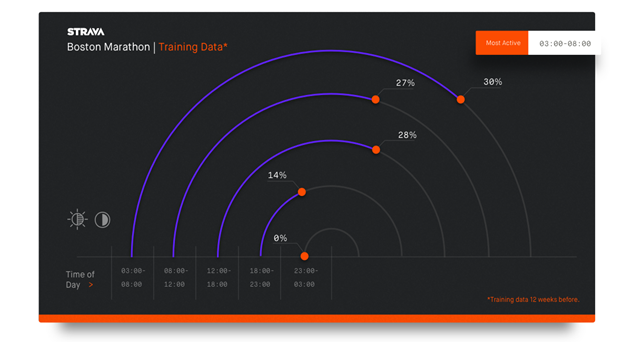
Strava, the social network for athletes, has revealed unique insights into the Boston Marathon from race day data as well as 12 weeks of training data taken from the 2016 Boston Marathon runners.
Some crazy stats?
- The most popular time to train was early morning, prior to 8 a.m.
- Average weekly mileage peaks at 45.7 miles three weeks prior to the race and tapers off to just 17.6 miles the week of the race.
- On average, men training for the marathon ran 5.3 times per week with a weekly mileage average of 41 miles. Women training for the marathon ran an average of 4.9 times each week with a weekly milage average of 35.6 miles.
- Boston Marathon racers are quick to recover, running again after just 5.4 days of rest on average.
Weekly Training
Athletes training for the Boston Marathon should be prepared to dedicate most of the week to training. On average, men training for the marathon ran 5.3 times per week with a weekly mileage of 41 miles. Women training for the marathon ran an average of 4.9 times each week with a weekly mileage average of 35.6 miles.
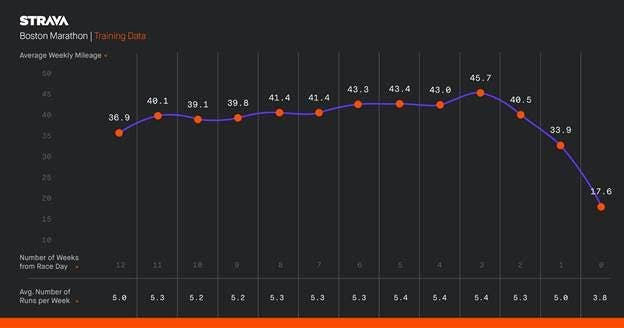
Building and Tapering
While the average number of runs remained relatively unchanged in the 12 weeks leading up to the race, the distance steadily increased until two weeks from the race. After that, athletes tapered off their distance. The average weekly mileage 3 weeks prior to the race rose to an all-time high of 45.7 miles, while the average weekly mileage the week prior to the race was just 17.6 miles.
Long Runs
Athletes’ runs qualified as long runs if they logged 15 miles or more in one session. Boston Marathon runners averaged a total 4.2 long runs over the course of 12 weeks, with the average long distance run coming in at 19.1 miles.
Training Times
Rise and shine! The most popular time for runners to train was between 3 a.m. and 8 a.m., with 30 percent of athletes training for the Boston Marathon logging activities between these times.
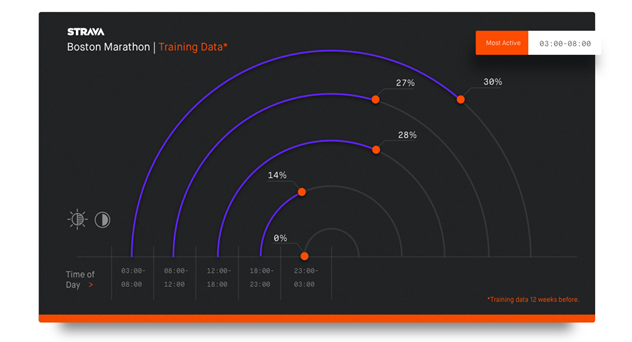
Community
Boston Marathon runners engaged frequently with the Strava community, taking more than 18,000 photos, receiving more than 1 million kudos, and commenting more than 93,000 times during training.
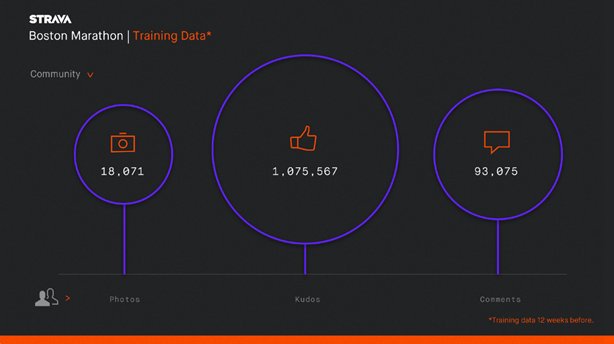
Race Day Data for Men and Women
According to Strava data, both men and women experienced their fastest mile at mile 4, and their slowest mile at 21, Heartbreak Hill. Running quickly at mile 4, while a slightly downhill segment, is also possibly an indicator of newfound freedom from the crowded early miles allowing runners to ramp back up to their planned target pace.
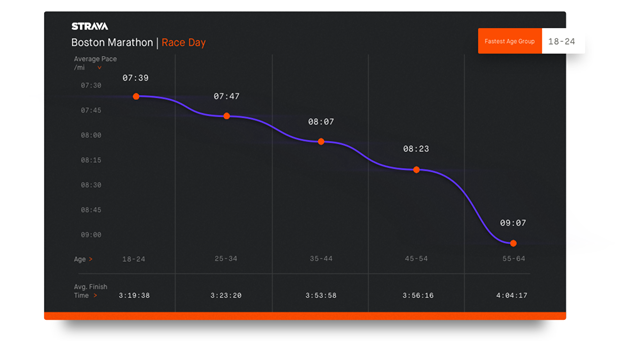
Race Day Data per Age Group
Strava race-day data shows that the younger an athlete is, the more likely he or she had a faster finish time at the Boston Marathon. Considering the qualifying times do get easier as you get older, this isn’t a total surprise. The 24 and under age group was the fastest, with an average a finish time of 3 hours and 19 minutes and an average pace of 7:39. This is followed by the 25-34 age group who finished in 3 hours and 23 minutes with an average pace of 7:47, and the 35-44 age group in third, with an average finish time of 3 hours and 31 minutes and an average pace of 8:07. The slowest age group was 65+ with a finish time average of 4 hours and 18 minutes and an average pace of 9:54.
Recovery
These are some serious athletes. Boston Marathon racers were the fastest to recover, with an average of just 5.4 days of recovery before their first post run race activity was logged.